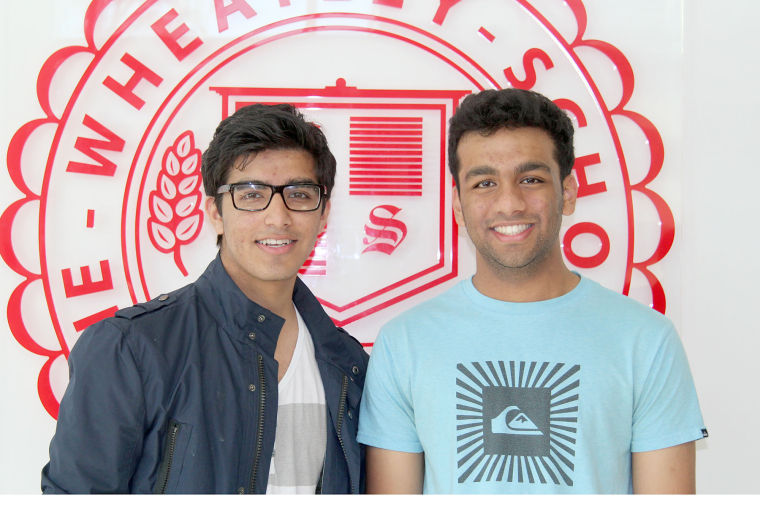Wheatley School junior Arjun Kapoor junior has earned a place as a regional finalist in the national Siemens Competition in Science, Math and Technology, and Wheatley senior Aakesh Jhaveri has been named a semifinalist.
Siemens revealed the regional finalists and semifinalists in the annual competition on Oct. 18.
Kapoor said his project focused on solving problems in super computers, which he said typically contain hundreds of thousands or millions of processors.
“Super computers are very inefficient. They don’t address the latency,” Kapoor said, referring to delays in processing.
Kapoor collaborated on the project over the summer with Herricks High School sophomore Sahil Abbi and Connor Abbott, a student at the Hopkins School in New Haven, Conn. They worked on solving the problem at Stony Brook University under the direction of their mentor, Dr. Yuefan Deng.
Kapoor said processors in super computers need to communicate with each other and can fall into a “gridlock pattern.” So he and his fellow researchers worked at identifying an algorithm that would create an optimal arrangement of the processors. He said the team worked particularly hard over the summer and into the fall to come up with an algorithm that would increase super computing efficiency.
“We just stayed up nights,” Kapoor said. “We created an algorithm.”
He said Deng was doubtful about the students’ ability to tackle such a large problem, but he said their mentor was pleased with the outcome. Kapoor was also pleased to be named a regional semifinalist with his fellow researchers.
“I feel good. It was very exciting when we found out,” Kapoor said.
“I was honestly ecstatic,” Kapoor’s Herricks partner Abbi said. “I didn’t realize how much promise the research showed until Siemens recognized it.”
Now they must compete against four other teams Nov. 15 and 16 in a regional competition at Carnegie Mellon Institute, preparing a power point presentation to defend the research paper they submitted to be selected as finalists. Success on the regional level would lead to the national finals competition in December in Washington, D.C.
Kapoor said the team is also looking into publishing a paper on their research.
Apart from his interest in computing and math, Kapoor is also an accomplished musician who plays oboe in the Wheatley Band and the Metropolitan Youth Orchestra. He also enjoys fencing.
Kapoor said he’s also the head of a local charity called Project Kidaoni that benefits a school in Tanzania. He and fellow Wheatley students conduct in-school fundraisers and also place collection boxes around the local community.
“We support the school infrastructurally as well as academically,” he said.
Aakesh Jhaveri was recognized for his work on chronic kidney disease research over the past two years at the Feinstein Institute for Medical Research. He said the research focused on the impact of increased levels of gene variance causing chronic kidney disease in African Americans.
“They make up the majority of people with chronic kidney disease,” Kapoor said.
Jhaveri said he started working on the project with his mentors, Dr. Pravin Singhal and Dr. XiQian Lan. A 2010 research study had showed that gene variances could cause increased rates of kidney disease. Jhaveri’s research took the work one step further.
“It showed how the gene variance caused kidney disease,” he said. “That leads to new treatments, targeted therapies.”
He said the work was both rewarding and time-consuming. He said he and his mentors had to identify the pathway that enabled harmful proteins to enter kidney cells and kill them.
“It was definitely exciting,” Jhaveri said. “It was months and months of long lab hours of trial and error.”
He wrote the 18-page research paper required for the Siemens competition himself and has since sent a paper to the Journal of the American Society of Nephrology. It would be the second research paper he has had published.
He said his research has also been submitted for a grant from the National Institutes of Health.
Last year, Jhaveri was a finalist in Intel’s International Science and Engineering Fair based on research on the correlation between hypoglycemia and HIV. HIV medications can cause hypoglycemia and his research established that hypoglycemia in turn aggravates HIV.
Jhaveri said he plans to earn medical and doctorate degrees in biomedical research and is applying to Brown University for early acceptance.
Among his other interests, he is on the varsity golf team. He also plays bass in the Wheatley Orchestra and said he finds a relationship between playing music and doing scientific research.
“When you look at a musical piece, you have to dissect it to figure out how to play it. The same is true of research,” Jhaveri said.
Wheatley science teacher Thomas Van Bell said both students are skilled as researchers and as presenters of their research.
“They’re amazing. They’re very dynamic people,” Van Bell said.



